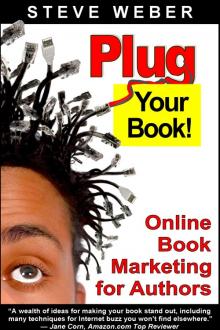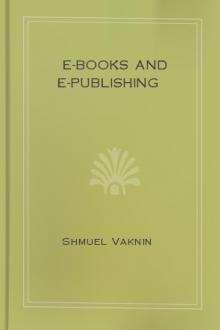Plug Your Book! by Steve Weber (books to read to be successful .txt) 📕

- Author: Steve Weber
- Performer: -
Book online «Plug Your Book! by Steve Weber (books to read to be successful .txt) 📕». Author Steve Weber
Google's first consumer bookselling initiative is called Instant Online Access. Consumers can purchase a perpetual license to view the entire contents of a book online. Publishers set the price for Instant Online Access, and Google keeps a 30 percent commission on sales.
Because selling online access to books might cannibalize sales of physical books, Google seems to be promising publishers that it will deliver more impulse purchases than brick-and-mortar bookstores. The program could promise better profit margins for publishers by freeing them from printing and distribution costs. For example, publishers keep as little as 30 percent of a paper book's cover price, with the rest split among bookstores, wholesalers and distributors.
Ad-Supported Access#Only 20 percent of a book's content normally is available for viewing in a given month on Google Book Search. However, publishers who are interested in publishing advertising-supported books can set the viewable percentage as high as they wish, all the way to 100 percent viewable. When publishers choose this Ad-Supported Access model, Google optimizes its ads for the book, trying to maximize revenue for the publisher. One publisher of travel books has enrolled all its titles in Ad-Supported Access on the theory that it won't hurt sales, while providing more chances that buyers will notice the books and decide to buy one.
Why would someone pay money for a book they can read for free on their computer monitor? A good percentage of travelers who are actually going on a trip to Italy, for example, will prefer to carry a pocket-sized travel book, and will likely buy one on impulse if they happen to see it. At least that's the theory.
Could it ever be possible for Internet publishers to earn more in advertising revenue from online viewership than in selling hard copies of their books? It's an intriguing idea, but it's unlikely we'll know the answer anytime soon. Google admits that ad payments to publishers have not been particularly strong.
Google Print on Demand#Google knows that print-on-demand book publishing is an attractive option for small and niche publishers, so it's targeting publishers who don't already have digital copies of their books. With its POD program, Google will take the digital scan it makes when it enrolls a book into Google Book Search and make the file available to printers if the publisher opts for POD.
Google will create the digital file required for POD printers for free when it optically scans the book for inclusion in Google Book Search, and will host the file free.
To participate, publishers must have their own account with a POD printer and a relationship with an online retailer to handle fulfillment.
In late 2006, Google was considering plans for three additional bookselling programs:
Publishers with questions or feedback can contact Google via e-mail at #Books-Support@google.com#.
In 2006 Microsoft began building a rival book-search service. Although Microsoft's network has only a fraction of Google's search traffic today, things change quickly on the Internet.
Get more information at:
#www.Publisher.Live.com#
Amazon UpgradeAlthough Amazon has been selling downloadable e-books for years, in 2006 it added a new twist. Amazon Upgrade provides buyers with online access and searching of physical books they've already purchased. To upgrade their books, readers pay about 10 percent to 20 percent of the book's original price, and Amazon splits the revenue with publishers.
Amazon Upgrade is designed to appeal to buyers who want to receive a physical copy of the book, but are also willing to pay a bit extra for immediate online access and searching. Buyers view the book online through the Amazon Reader, the same interface used for Search Inside the Book. Amazon Upgrade users can print pages, but publishers can set the number of allowable printed pages.
Amazon users can view which previous purchases are available for Upgrade by browsing #Your Media Library#:
#http://amazon.com/gp/library#
Another place to view your list of upgradable books is:
#www.Amazon.com/gp/sitb/ purchasing/booklist#
Amazon hopes Upgrade will appeal to publishers concerned that online access to books might cannibalize sales of physical books, cutting publisher revenue. With Upgrade, any purchases result in added revenue for publishers, since readers have already purchased the hard copy.
To be eligible to purchase upgrades, readers must buy the book directly from Amazon. Upgrades aren't available for books bought used or new from third-party Amazon vendors.
Amazon's Mobipocket#In addition to Upgrade, which enables online viewing and searching, Amazon continues to sell e-books that readers can download. But in 2006 Amazon stopped selling Microsoft and Adobe-format books to focus on selling e-books through its wholly owned subsidiary, Mobipocket. The free Mobipocket Reader software allows users of PDA handheld computers to view e-books in the Mobipocket format.
Mobipocket books will also be sold through other online retailers. The promise, especially for self-published authors, is the potential to reach millions more readers at low cost.
Mobipocket, along with Amazon's BookSurge self-publishing unit, could enable Amazon to take a big share of the world's vanity-press business with little risk. Selling paid placement and other listing enhancements such as keyword visibility could provide a significant new revenue stream for Amazon.
Skeptics worry that Mobipocket could create a monopoly in the e-book marketplace if Amazon sells only Mobipocket books and the format becomes dominant. Traditional publishers are concerned that giving virtually free content-creation tools to millions of independent writers will undercut prices of all books.
To join Mobipocket, register at its publisher portal, eBookBase:
#www.Mobipocket.com/eBookBase/en/homepage/apply.asp?Type=Publisher#
Then register, print and sign Mobipocket's publisher agreement:
#www.Mobipocket.com/eBookBase/en/Homepage/pub[underscore]agreement.asp#
Fax in the agreement. After Amazon receives your signed publisher agreement, the Mobipocket team will notify you via e-mail of your account activation. Then you can log into eBookBase to start uploading and selling your e-books.
To convert your books to the Mobipocket format, you can download a free copy of the necessary software, Mobipocket Creator, Publisher Edition. You'll be able to upload directly from the Mobipocket Creator software or using the eBookBase Web interface:
#www.Mobipocket.com/eBookBase/en/Homepage/default.asp#
The e-books you've uploaded will be available through Amazon, Mobipocket.com and other retailers. For a list of retailers who sell the books, see:
#www.Mobipocket.com/ebookbase/en/homepage/partners.asp?Type=Retailer#
For more information, join the mailing list of Amazon's Digital Text Team by sending an e-mail to #DigitalBooks@Amazon.com#.
Amazon digital audio#Digital audiobooks are one of the fastest-growing book categories. Amazon has been developing a digital audiobook store and drafting its contract for publishers. As of late 2006, Amazon was still accepting audiobooks from publishers who wish to send them through postal mail on a CD or USB 2.0 drive.
Subscribe to announcements regarding this program by sending an e-mail to #Digital-Audio@Amazon.com#.
Amazon PagesAmazon Pages sells pay-per-view access to small portions of books, down to the chapter, section or even page level. Publishers set the price and Amazon splits the revenue.
Publishers interested in participating can get more information by sending an e-mail to #DigitalBooks@Amazon.com#.
So far, electronic books, or e-books, haven't gotten much traction with consumers. Until an excellent, inexpensive reader gadget becomes available, e-book sales probably won't be significant. In the meantime, though, e-books and downloadable excerpts are a good way to generate awareness of your book and to distribute spin0ff products like special reports.
Amazon Shorts#Authors can use Amazon Shorts as a vehicle for publicizing new books or promoting backlist titles. Readers pay 49 cents to download the Short in plain text or PDF format.
For example, historian David McCullough used an Amazon Short to build awareness of his 2006 hardcover 1776. His Short was a 1,700-word essay titled "Faces" on how Revolutionary War leaders are perceived today. The Short included links to 1776 and nine previous McCullough works sold on Amazon.
Each Amazon Short includes an author biography and photograph, and links to their other books sold on Amazon. Shorts are a good way for readers to try new authors because the low price encourages reader experimentation and impulse buying.
Some authors have used Shorts to serialize works, or to update readers with extensions of their books, or an entirely new story with familiar characters.
Some nonfiction authors have used Shorts to generate new customers for other products. In one longtime bestselling Short, Why Authors Are Cranky, author Bruce Holland Rogers promotes his own Web site, where readers can purchase a one-year e-mail subscription to Rogers' short stories for $10. The Web link in Rogers' Amazon Short is live, so readers can click right to the site:
www.ShortShortShort.com#. Client acquisitionOne of the most prolific Amazon Shorts authors is business consultant Lonnie Pacelli, who has 15 bestselling Shorts. His Shorts are cross-promotional tools for his two business hardcovers and 13 full-length downloadable e-books sold on Amazon for $4.99 each. All these e-books help promote fee-based seminars Pacelli conducts on his Web site. His most popular Amazon Short is The Perfect Brainstorm.
Shorts can be used to test ideas for full-length books or expanding into new topics or genres. Authors can use Shorts as full-blown laboratories, testing story concepts and soliciting reader feedback. For example, fiction writers can update characters from a book series, giving hints on what might happen in the next hardcover installment, with readers serving as a focus group.
You can browse and search all Amazon Shorts here:
www.Amazon.com/Shorts#.Some other interesting work with Amazon Shorts:
In A Man and His Luggage, Stuart Woods departs from his tried-and-true mystery genre for a humorous essay on how to find the perfect travel companion.
In his Short Bubble After Bubble in the Ongoing Bubble Boom, Harry S. Dent updates his 2004 economics bestselling hardcover The Next Great Bubble Boom. Six months later, his publisher issued an updated edition of the hardcover.
Amazon recommends a length of 2,000 to 10,000 words for Shorts, and requires they be exclusive to Amazon for the first six months. Publishers keep 60 percent of the revenue, while Amazon covers the cost of payment collection and customer service.
There's no copy protection for Amazon Shorts; the text or PDFs can be printed, copied, and forwarded via e-mail. When viewed as an HTML document, the text can be copied and pasted into a word processor.
To apply for participation in the Amazon Shorts program, send an e-mail to #Amazon-Shorts@Amazon.com#. To be eligible, you must have at least one book currently for sale on Amazon.
Selling e-books on your site#Self-publishers are free to sell their book as a PDF document from their own Web site. You can also add spin-off reports, or perhaps even compile your blog posts into a booklet.
Selling downloadable text files or PDF documents and collecting payments with PayPal or a credit-card merchant account is one option. You can further automate the process by using one of these services:
"Information wants to be free," as the saying goes. Yet it's also true that the best way to sell information is by giving some away free. You can apply this to fiction, and particularly to nonfiction, where every bit of





Comments (0)